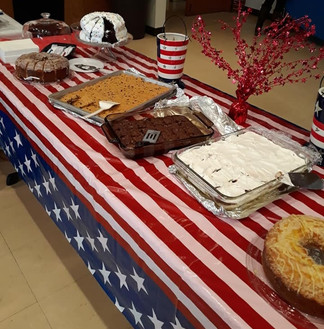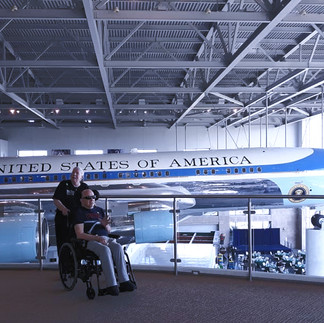Subconsciouly
- kimorendor
- Aug 30, 2025
- 8 min read
Sub-con-scious-ly [səbˈkänSHəslē]
Adverb
In a way that is influenced by the part of the mind of which one is not fully aware.

I swear when I started writing my latest novel, I was very conscious of its inspiration and how it would play out.
Four months after my dad passed away, my mom and I visited his hometown of Lexington, Missouri, to take part in a Celebration of Life his family organized in his memory. It had been several decades since I’d been in the Show Me State, but the warm greetings made it feel like I’d never left.
The visit was equal parts heartwarming and heartbreaking. My dad’s family did an amazing job of honoring his life with a beautiful service. People shared their favorite memories of him, which brought laughter and tears. The reminiscing continued during the potluck as people shared over plates piled high with Midwest delicacies.
The following day while the rest of the town fell quiet, my cousin Ronnie Sims told me to hop in the car. It all happened so fast, I didn’t ask where we were going or grab my cell phone. He drove around Lexington, pointing out places he remembered going with my dad. There was the VFW Hall, Maid-Rite Drive In, the former Wentworth Military Academy, the Presbyterian Church, and the home of his former Scout leader and U.S. House of Representatives member, Ike Skelton.
Each place became a memory portal. I could see the events as Ronnie described them. My dad’s childhood was playing out in my mind.
From the Scout Leader’s house, we traveled down Myrick Road, over a bridge, and pulled off into an empty lot. Ronnie said this was the spot where my dad’s childhood home once stood. I thought about getting out but remembered along with my phone, I’d forgotten to put on shoes.
There were few signs of people and even fewer that a house had been there. Stuck between a busy road and the railroad tracks, years of my dad’s life unfolded. He lived a lot of life in that patch of land.
A bright red cardinal landed on a tree branch toward the back of the lot. It was the last piece of the writing puzzle. All the stories, the literal trip down memory lane, inspired me to write. I would let my dad’s childhood tales be the starting point for a book.
I jotted down the stories I’d heard over the Celebration of Life weekend, and I added all the tales I could remember hearing. There was my dad’s early childhood stutter being cured by filling his mouth with rocks. There was a life-changing encounter with the Wooly-Bully as my dad walked home alone after an evening Scout meeting. There was the time he jumped on a train to visit the next town over and more.
For the longest time, I thought he made up at least 95 percent of his childhood. After all, I’d read Mark Twain’s stories and figured all Missourian’s were prone to exaggeration. I was shocked when I met people who corroborated the vast majority of his stories, including the Wooly-Bully.
I mulled over all the stories for several weeks and not only did the idea for a novel come together but also for a series. It was time to type.
Writing the story was like the Celebration of life: a mix of laughter and tears. Some scenes flew from my head to my fingers to the screen with ease, others had to be pecked out one word, sentence, graph at a time. Creating a story inspired by my dad’s childhood took so much more emotional strength than writing my memoir. It felt there was more at stake.
When I finished, I felt I had a great story. But to be sure, I sent it to a select group of readers I knew would tell me the good, the bad, and the weirdly worded parts of the novel. Waiting for feedback was a bit torturous but necessary to know if I’d not only written a good story but also honored my dad.
Thankfully, 90 percent of the feedback was positive. The remainder included some continuity and character issues, which was to be expected in a novel jumping between 1956 and the present. I read and reread their notes. I was over the moon, and then a note about the modern-day main characters toppled in my head.
I started crying. For the first time, I knew the real reason I wrote the book.
Yes, I wanted to share those crazy childhood stories. Who doesn’t want to write a book with Bigfoot in it?
But there was a much deeper reason. One buried deep in my subconscious that I don’t think I ever would have uncovered had I not read the comment about the way the two main characters interacted with each other.
In the spirit of the book, let’s travel back in time. But we’re not going all the way back to 1956.
We’ll take a nice quick rewind to 2018 when I moved from Los Angeles to the Sacramento area to become a caretaker for my dad who was undergoing treatment through the VA for a rare neurological disease.
My first couple of years back home were getting to know the VA hospital, filling out paperwork in triplicate, and learning the difference between Parkinson’s and Progressive Supranuclear Palsy (PSP). While neither disease is kind, PSP progresses at a faster rate and is often misdiagnosed as Parkinson’s in the first three years. My dad had PSP.
Not knowing how much time we had left together, it was important to make sure we had as much fun and joy in our lives as possible. We were able to get a wheelchair van in 2022. We took loads of boring trips to the VA, but also short fun trips around the Sacramento Area.
Our first big trip was to Tucson to take part in the Tucson Festival of Books in March. I would be signing copies of my debut memoir. I’m sure most people would take the direct route along major interstates. But where’s the fun in that when you’re trying to make memories.
We went to Tucson via Yosemite with a night in the historical Ahwahnee Hotel in March. The amazing valley didn’t disappoint, but the windy roads were a bit much for me and dad. The van and mom were fine.
We stopped at a tank museum in the middle of nowhere on an uncle’s recommendation more because the stop had gas and soft-serve ice cream and not the tanks. Turns out Dad wanted to see the tanks, so we enjoyed the General Patton Memorial Museum and the cool treats.
On our way home from Tucson, we stopped and had lunch with a family friend in Burbank, visited The Original Farmer’s Market in Los Angeles, and then headed over to Simi Valley to take in the Reagan Library.
The next month we headed south again for the L.A. Times Festival of Books on the University of Southern California campus. We took in the rose garden at Exposition Park when I wasn’t at the festival. On the way home, we visited the Skirball Cultural Center, just north of The Getty. The Skirball always has great exhibits. This visit featured the history of the delicatessen, which meant the restaurant had amazing Reuben sandwiches.
We were enjoying our travels, and Dad mentioned wanting to visit his family. Planning trips to Arizona and Southern California wasn’t too bad, but the thought of plotting a road trip with the parameters of no more than six hours driving a day more than halfway across the country was daunting.
Then Dad’s doctor seemed to dash all hope when she said he certainly can’t fly, and he shouldn’t take any long road trips. But, she didn’t define long.
I looked at “nearby” places that featured loads of cheap hotels and inexpensive flights and reached out to his family to see if maybe there was a possibility they could come out to Las Vegas. The timing was off, and none were able to come.
It wasn’t long after that that Dad told me it was okay, he didn’t want to go to Missouri anymore. I could tell he wanted to, but I could also tell he was tired, so I didn’t push it.
A week or so later, Dad seemed to have found a second wind. It was common for PSP to have ups and downs. He decided he’d wanted to go home, and I started planning our trip. We’d decided to coincide the trip with a book festival in Nashville, Tennessee. (I mean if you’re driving to Missouri, what’s a couple more states?)
We picked a weekend to reach Lexington, and I started to re-engineer our route. Plans were moving forward. Dad was sharing childhood stories. And then one Friday morning he collapsed in my arms.
Hospice nurses came to the house Monday and set everything up in the living room.
Local friends and family came to visit, and phone calls came from Missouri. Father’s Day 2022 was the last I spent with my dad. It was the last time he was conscious. We said our nightly I love yous, and four days later he passed away.
Following the funeral, a cousin from my dad’s side of the family reached out to me and asked if we were still planning on coming because the family would like to have a Celebration of Life. I’d pretty much forgotten about the trip, but Mom and I felt that it would be a good thing, and we’d even continue the trip to Nashville.
I’m not sure I was looking for closure from the Celebration of Life. My dad and I had worked out a good system of communication. We had good days, bad days, great day, sad days, but at the end of each day, I’d apologize for anything I may have done wrong. I also started saying, “I love you,” each time I’d leave him just to make sure I knew those would be the last words he’d heard from me.
I promised to stay with him through it all, and I did. I promised to figure out the VA, and I had (as well as anyone can). I promised to make spam and eggs for breakfast, and I did. I did my best, which is why I thought it was strange the note about the relationship between the characters nagged at me.
Zeke is the older character. His Missouri childhood is sprinkled with stories inspired by my dad’s youth. By a terrible twist of fate, Zeke is living in a not-so-nice senior facility in Florida with little to his name.
Nate is the younger character. An orderly at the facility, he’s assigned to care for Zeke.
When a clever plot twist prods Zeke to return home, Nate agrees to drive him back to Missouri. (I’ll let you read the book to find out the rest.)
I reread the comments my friend made about the characters, how they interact, the ease of dialogue, how sweet it was for him to drive him home.
I broke down sobbing again, and to be totally honest, much of this essay is written through tears. I broke down because I learned I did have one regret about being a caretaker for my dad.
I cried because God in his wisdom and odd sense of humor dropped a plot point into my brain that I didn’t even know I needed.
I could have put Zeke anywhere on the planet. I could have had him still living in Missouri. I could have put him in Europe, so he’d fly. But no, I put him in a nice driving distance and stripped him of his driver’s license, so he’d need a chauffeur.
I created a Nate to do for Zeke what I could not do for my dad.
Subconsciously, I drove my dad home through Nate.
“I” drove him past his Scout Leader’s home, down Myrick Road, and to that empty plot of land where Zeke sees a cardinal in the tree and knows his family is thinking of him.


































Comments